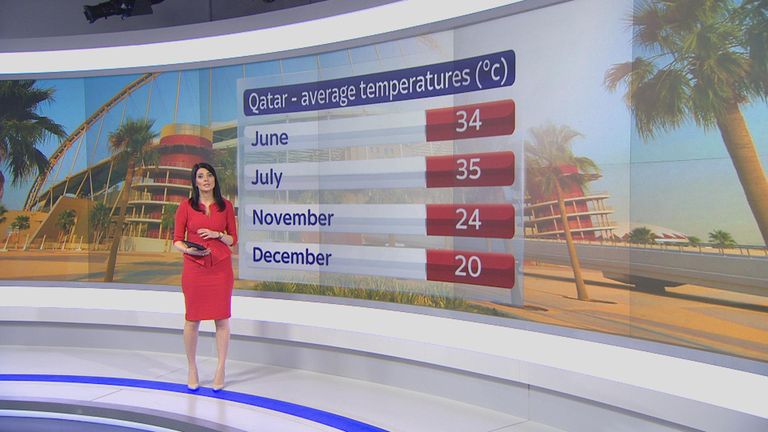Qatar 2022: What does a winter World Cup mean? How hot will it be? And how much hassle will it cause?

Wednesday 25 February 2015 13:07, UK
How much disruption would a winter World Cup cause? And will Qatar be that much cooler in December? We tackle some key questions...
A FIFA Task Force has recommended that the 2022 Qatar World Cup be played in November and December for temperature reasons - but the heat remains firmly on world football's governing body following the latest development in a long-running saga.
Premier League chief executive Richard Scudamore claims Europe's major clubs are "very disappointed" with the proposal - announced in Doha on Tuesday after a six-month consultation process - while FA chairman Greg Dyke fears disruption to the "whole football calendar".
But what are the implications for football across the globe? We've done some digging...
Do we know the actual dates of the 2022 World Cup?
Not yet - only that "late November to late December" is being recommended by the FIFA Task Force. There have been suggestions the final could be played as late as December 23 but a decision on timing will be taken by FIFA's executive committee on March 20.
Could the final really be held on December 23?
That date would be too near Christmas for European liking. It also lands on a Friday in 2022. A more likely date would be Sunday, December 18 2022 - which also happens to be Qatar National Day.
Would there still be a Christmas programme in Britain?
That depends on the timing of the final; a traditional festive schedule would still be possible if the World Cup showpiece is held on December 18. Dyke says the FA will try to protect Christmas fixtures.
What disruption will there be to the Premier League?
The Premier League, Champions League and Europa League will all be affected as they will have to reschedule matches due to be played in November and December.
In the Premier League this season there were 40 games played in November and 60 in December. That's a total of 100 fixtures that would have to be rearranged in England's top flight, were these proposals to go ahead.
The Premier League also provided the most number of players at last summer's World Cup - at 106, 25 more than any other league.
How would the other European leagues be affected?
Disruption to some European leagues will be reduced due to the fact that they already include winter breaks; the Russian league takes three months off due to cold weather, while Germany takes a month's breather. The Premier League apart, Europe's other top leagues each shut down for at least a fortnight but all of these breaks start towards the end of December - meaning all will still experience some disruption.
It is likely the European club season would subsequently finish at the end of June rather than May. There could be a knock-on effect delaying the start of the FA Cup third round, as well as the semi-finals and final of the League Cup.
Could the Scottish leagues and Football League competitions continue at the same time as the World Cup?
It would be very possible for those leagues containing teams without many World Cup players to play on - probably after the group stage of the World Cup has finished. Norway started its top-flight season on July 4, 2014 - some nine days before the final of the World Cup.
What about other tournaments?
The Africa Cup of Nations would normally take place in January of 2023, while the Copa America would be expected to be held during June 2023. Both of those tournaments are likely to be affected.
How much cooler will Qatar be in the winter?
In June and July - the traditional months for the World Cup - the average temperature in Qatar reaches 34/35 degrees. That does drop later in the year but it's still very hot: an average of 24 degrees in November and 20 in December - still higher than the average for any month in England.
What's been the reaction in Europe?
The chairman of the European Club Association, Karl-Heinz Rummenigge, has called on FIFA to compensate clubs, whom, in his view, cannot be expected to bear the costs of rescheduling fixtures. The ECA represents the richest and most powerful clubs in Europe including Rummenigge's - Bayern Munich.
The German Football League agrees that a World Cup in November and December would be a financial as well as organisational burden for European leagues.
But Serbia's FA has given the proposal the thumbs-up, not only for the well-being of players and supporters. A tournament in November and December "would, provided we qualify, practically coincide with our winter break."
Will FIFA make any concessions?
There are no plans to reduce the size of the tournament from 32 teams or 64 matches but the proposed new dates would lead to the competition being shortened and played at fewer venues. There will be clamour for a shorter preparation period and fewer international dates that season.
What happens next?
The decision was announced at a meeting in Doha on Tuesday and follows a six-month consultation process. The proposals have the backing of all six confederations - including UEFA - but the final decision will be taken by the FIFA Executive Committee in March.
Scudamore, one of the most outspoken opponents to Tuesday's announcement, says he will continue to argue his case. "Clearly there is still time within the process to consider our position further," he said, "but first we will consult with our clubs, other stakeholders in English football, and other leagues before deciding on what, if any, further action might be appropriate or worthwhile."




